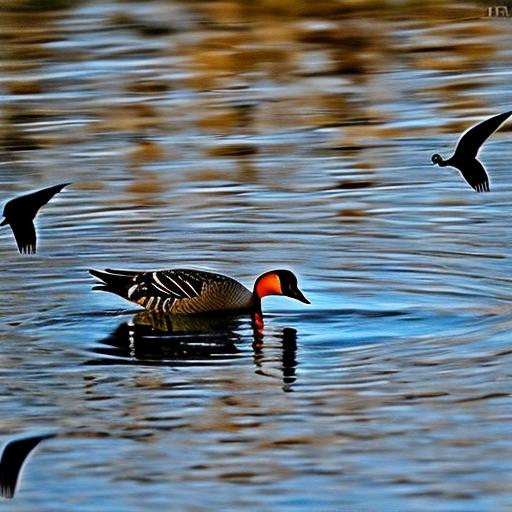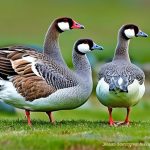Lakefronts are often considered to be some of the most beautiful and serene places in nature. They provide a peaceful escape from the hustle and bustle of everyday life, and are home to a wide variety of wildlife. One common sight on lakefronts is the presence of geese, gracefully gliding across the water or waddling along the shore. While geese can add to the charm of a lakefront, they can also become a nuisance when their numbers become too high. They can cause property damage, leave behind droppings that can be a health hazard, and disrupt the natural balance of the ecosystem. In this article, we will explore various methods for deterring geese from lakefronts, allowing both humans and geese to coexist peacefully.
Key Takeaways
- Geese are social animals that prefer to live in flocks and follow a leader.
- Lakefronts provide geese with food, water, and shelter, making them a popular destination.
- Fencing or netting can physically prevent geese from accessing lakefront areas.
- Decoys can trick geese into thinking an area is already occupied, deterring them from landing.
- Noise deterrents, scent deterrents, motion-activated sprinklers, and natural predators can all be effective in deterring geese.
Understanding the behavior of geese
Geese are social animals that prefer to stay in groups, known as flocks. They have a strong sense of community and rely on each other for protection and survival. Geese are also known for their migratory patterns, with many species traveling long distances to find suitable breeding grounds and food sources. During breeding season, geese can become territorial and aggressive, especially if they feel threatened or their nests are disturbed.
Identifying the reasons geese flock to lakefronts
There are several reasons why geese are attracted to lakefronts. One of the main reasons is the abundance of food and water that these areas provide. Lakefronts often have lush vegetation and aquatic plants that serve as a food source for geese. Additionally, lakes and ponds offer a reliable water source for drinking and bathing.
Lakefronts also provide geese with a sense of safety and security. These areas are often free from predators that may pose a threat to them or their young. The open space and clear sightlines allow geese to keep an eye out for any potential danger.
Creating a physical barrier with fencing or netting
One effective method for deterring geese from lakefronts is to create a physical barrier using fencing or netting. This can prevent geese from accessing the area and causing damage. When installing a fence or netting, it is important to ensure that it is tall enough to prevent geese from flying over it. The fence should also be buried at least a foot into the ground to prevent geese from digging underneath it.
Regular maintenance of the fence or netting is crucial to ensure its effectiveness. Any holes or gaps should be repaired promptly to prevent geese from finding a way through. It is also important to regularly check for any signs of wear and tear, and replace any damaged sections as needed.
Using decoys to deter geese
Another method for deterring geese from lakefronts is to use decoys. Decoys can trick geese into thinking that there are predators nearby, causing them to feel unsafe and avoid the area. One effective decoy is a fake coyote, as geese are naturally wary of these predators. Another option is a fake owl, as geese are also afraid of birds of prey.
When using decoys, it is important to move them around periodically to prevent geese from becoming accustomed to their presence. This will help maintain their effectiveness in deterring geese over time.
Implementing noise deterrents such as alarms or horns

Geese are sensitive to loud noises and sudden movements, so implementing noise deterrents can be an effective way to keep them away from lakefronts. One option is to use air horns or motion-activated alarms that emit loud sounds when geese approach. These sudden noises startle the geese and make them uncomfortable, encouraging them to leave the area.
It is important to note that noise deterrents should be used sparingly and strategically. Constant noise can become ineffective over time as geese become accustomed to it. It is best to use noise deterrents in combination with other methods to maximize their effectiveness.
Utilizing scent deterrents like predator urine or essential oils
Geese have a strong sense of smell, and certain scents can repel them from lakefronts. One effective scent deterrent is predator urine, such as coyote urine. Geese associate the scent of predators with danger and will avoid areas where they detect these scents. Another option is to use essential oils, such as peppermint oil, which geese find unpleasant.
When using scent deterrents, it is important to regularly reapply them to maintain their effectiveness. Rain and other weather conditions can wash away the scents, so it is important to monitor the area and reapply as needed.
Installing motion-activated sprinklers or water jets
Geese dislike getting wet, so installing motion-activated sprinklers or water jets can be an effective way to deter them from lakefronts. When geese approach the area, the motion sensors will activate the sprinklers or water jets, causing the geese to become wet and uncomfortable. This will discourage them from staying in the area.
It is important to position the sprinklers or water jets strategically to cover the areas where geese are likely to gather. Regular maintenance is also necessary to ensure that the sprinklers or water jets are functioning properly.
Removing food sources and maintaining a clean lakefront
Geese are attracted to areas with abundant food sources, so removing these sources can discourage them from staying in the area. This includes removing any spilled birdseed or other food waste that may attract geese. It is also important to regularly clean up any droppings or other debris that may accumulate on the lakefront.
Maintaining a clean lakefront not only deters geese but also helps maintain a healthy ecosystem. Excessive droppings can pollute the water and harm other wildlife, so regular cleaning is essential.
Encouraging natural predators like hawks or eagles
One natural way to control the geese population is to encourage the presence of natural predators, such as hawks or eagles. These birds of prey feed on geese and can help keep their numbers in check. However, it is important to note that interfering with the natural ecosystem should be done with caution and under the guidance of wildlife management experts.
Seeking professional help from wildlife management experts
If all else fails, it may be necessary to seek professional help from wildlife management experts. These experts have the knowledge and experience to provide effective and humane solutions for geese problems. They can assess the specific situation and recommend the most appropriate methods for deterring geese from lakefronts.
When hiring a wildlife management company, it is important to do thorough research and choose a reputable and experienced company. Reading reviews and asking for recommendations from others who have dealt with similar issues can help ensure that you are hiring a reliable professional.
Deterring geese from lakefronts can be a challenging task, but with the right methods and strategies, it is possible to create a peaceful coexistence between humans and geese. By understanding the behavior of geese and identifying the reasons they flock to lakefronts, we can implement effective deterrents such as physical barriers, decoys, noise deterrents, scent deterrents, water-based deterrents, and maintaining a clean lakefront. Encouraging natural predators and seeking professional help from wildlife management experts are also viable options. By taking action and finding a solution that works for their specific situation, individuals can enjoy the beauty of lakefronts without the nuisance of too many geese.
If you’re looking for ways to keep geese off your lakefront, you might also be interested in learning about how many eggs geese lay. Understanding their breeding habits can provide valuable insights into their behavior and help you devise effective strategies to deter them. Check out this informative article on poultrywizard.com to discover fascinating facts about geese and their egg-laying patterns. By gaining a deeper understanding of these magnificent creatures, you’ll be better equipped to protect your lakefront from unwanted visitors.
FAQs
What are some common problems caused by geese on lakefront properties?
Geese can cause damage to lawns, gardens, and landscaping, as well as leave behind large amounts of droppings that can be unsightly and unsanitary.
What are some effective ways to keep geese off your lakefront?
Some effective ways to keep geese off your lakefront include using decoys, installing fencing or netting, using noise deterrents, and planting vegetation that geese do not like.
What are some natural ways to deter geese?
Some natural ways to deter geese include planting vegetation that geese do not like, using reflective surfaces to scare them away, and using dogs or other animals that geese are afraid of.
Is it legal to harm or kill geese?
In most cases, it is illegal to harm or kill geese without a permit. It is important to check with local authorities and follow all regulations when dealing with geese.
What should I do if I have a large number of geese on my lakefront?
If you have a large number of geese on your lakefront, it is important to take action to deter them. This may include using multiple methods of deterrence, such as decoys, fencing, and noise deterrents. It is also important to regularly clean up any droppings to prevent the geese from returning.
Meet Walter, the feathered-friend fanatic of Florida! Nestled in the sunshine state, Walter struts through life with his feathered companions, clucking his way to happiness. With a coop that’s fancier than a five-star hotel, he’s the Don Juan of the chicken world. When he’s not teaching his hens to do the cha-cha, you’ll find him in a heated debate with his prized rooster, Sir Clucks-a-Lot. Walter’s poultry passion is no yolk; he’s the sunny-side-up guy you never knew you needed in your flock of friends!







